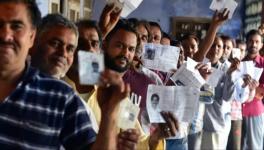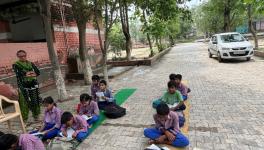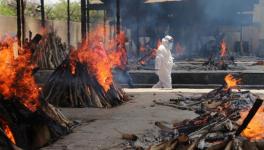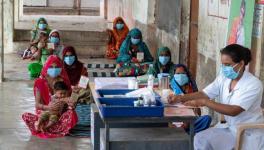Haryana: Hundreds of ASHAs Test Positive in 2nd Covid Wave; 10 Die But No Compensation Paid
Representational use only.
Suman, a 36-year-old Asha worker from Haryana’s Jhajjar district, died on April 30 days after she tested positive for COVID-19. She was brought to PGIMS Rohtak on April 27 but could not be saved due to the lack of oxygen, according to her husband Bijender Kumar. Suman was the first ASHA worker to have died in the pandemic in the old city of Rohtak in Haryana.
“All she kept saying before her death was to make sure that the children study and become officers so that they do not have to suffer through abject poverty as we did,” Bijender told Newsclick.
One month later, the family is scrambling to make their ends meet. Bijender is currently unemployed. He owns a buffalo and sells its milk to his neighbours. The family is yet to receive the Rs 50 lakh insurance that the central government had promised for the healthcare personnel who died while on COVID-19 related duty.
“I went to the district magistrate’s office in Jajjhar and was told categorically that my family is not eligible,” said Kumar.
In Panchkula district, the family of Kavita, another ASHA worker who died of COVID, could not avail insurance. While the family was reluctant to speak, her fellow colleague, Surekha, also a member of the Centre of Indian Trade Unions (CITU), said that Kavita had tested COVID positive and was admitted to the hospital where she died of heart attack.
While the death of Suman and Kavita have instilled fear among ASHA workers in the district, it has also exposed fault lines in the state and central governments’ treatment of frontline workers.
Prove the Dead was COVID Positive
Suman and Kavita were among millions of ASHA workers who are the backbone of the country’s healthcare system on ground, and have been fighting the COVID-19 battle from the forefront.
Hundreds of ASHA workers have tested positive and 10 of them died in Haryana during the second wave of the pandemic, according to the Centre of Indian Trade Unions (CITU). None of the families, as claimed by the Union, have received the insurance amount announced last year. Recently, the government has extended the Insurance scheme for frontline workers for another six months in the backdrop of the surge in the cases.
“The families of ASHA workers who have died on duty have not received the insurance compensation. Their condition is really bad. There is no job security but work hours are extended. And no amount is paid to their families even after their deaths,” said Jai Bhagwan, CITU Haryana’s secretary.
In both the cases of Suman and Kavita, their applications for insurance have been rejected over the families’ inability to prove that they were COVID positive. The bereaved families of the healthcare workers are struggling to get the hospitals issue the required documents to be submitted for availing the insurance scheme.
In case of Kavita, her colleague Surekha said that doctors have not been granting COVID death certificates. “Doctors are saying that she had COVID but she primarily died of heart attack and not COVID. However, her oxygen level had dropped to 50 and she was gasping for breath and a day later she died of heart attack,” Surekha told Newsclick.
Under the insurance scheme, the hospital authorities have to certify that the worker died of COVID-19 and only then the deceased person’s family can avail the insurance.
“Not even a single family has received the insurance. And the hospitals are not drafting certificates refusing COVID as the primary reason behind their deaths,” said Surekha.
No Masks and Sanitisers
Bajinder Kumar, husband of Suman – an ASHA worker who died of COVID – said that his wife was not given a mask, gloves, PPE kit or even sanitiser.
“She would wear Dupatta around her nose and mouth. I had bought a sanitizer from the market. There was no safety gear given to her,” Bajinder added.
Days before her death, Suman, who was fully vaccinated, went for door-to-door screening and sampling of families who showed symptoms. She also educated people about the illness, emphasising the importance of wearing a mask and sanitising hands. She would also visit the families of COVID-positive patients to distribute medicines weekly.
It has been over a year since COVID wrecked havoc in India, and still safety gears were not provided to the workers, Bajinder said. “It’s a shame on the government that even after a year and a half, ASHA workers are working without safety gears and are tasked with all kinds of work without compensation and offs,” said Anita Kumari, another ASHA worker.
Over 19,000 ASHA workers across Haryana had recently joined the nationwide protest called by ASHA workers united under the umbrella of the CITU. The workers in every district had suspended their work and demonstrated outside the primary health care centres, sub-health centre and CMO offices.
Anita said that the intention of the protest was to draw attention towards the deplorable conditions of ASHA workers across India.
“Every day, we hear the news of an ASHA worker testing positive. Their families can not even afford private treatment. Yet, the government has shown an insensitive attitude towards us,” Anita added.
Difficult Terrain of Work
Since the vaccination drive has been launched, ASHA workers who predominantly work in the rural areas are having a difficult time. They say that the villagers are showing acute vaccine hesitancy because of which the workers are facing a lot of trouble.
Sunita, another ASHA worker from Rohtak, said that since the vaccination drive, the workers have been raising awareness about the importance of vaccines. “We insist the villagers to come out and get vaccinated but we are hearing strange answers with people saying ‘we are alright. We don’t want to be vaccinated.’”
Even as India is aiming at vaccinating the entire population by the end of this year, it is the ASHA workers and other health personnel who are making the work possible on the ground. “We go home after home telling people why vaccination is important. Also pushing them to get vaccinated,” Sunita said.
After working for 10 hours a day, Sunita said they were not even able to meet their families. “We isolate ourselves because you never know after coming in contact with several families,” she said. She has not even been able to mourn her brother’s funeral who died after a brief period of illness. “I was working that day. I could not take an off. My work is as important as the life of my brother,” she said.
Get the latest reports & analysis with people's perspective on Protests, movements & deep analytical videos, discussions of the current affairs in your Telegram app. Subscribe to NewsClick's Telegram channel & get Real-Time updates on stories, as they get published on our website.
























